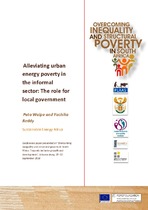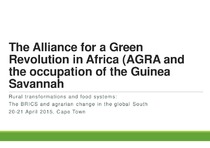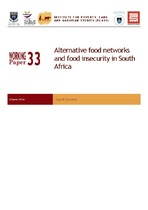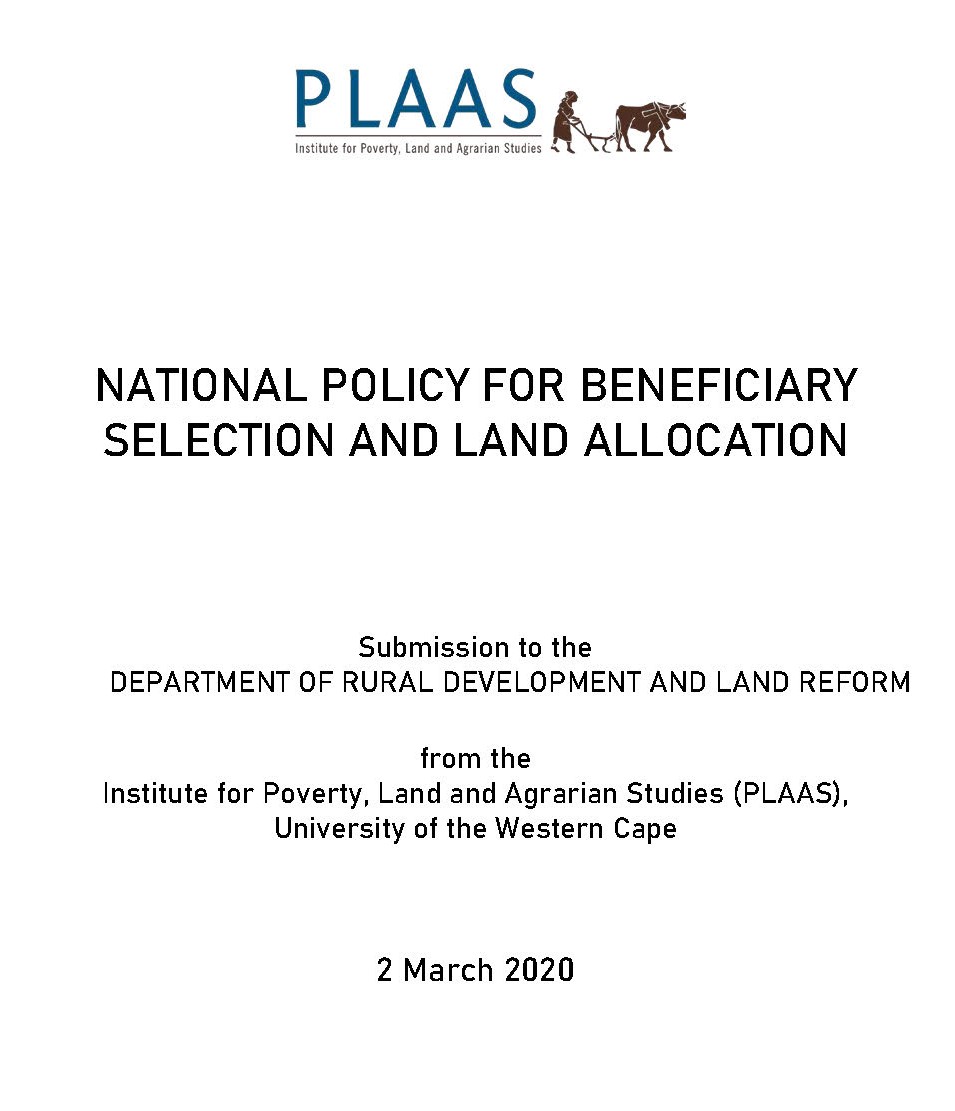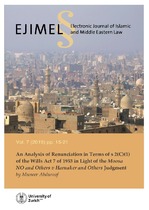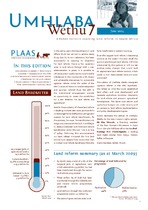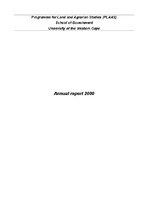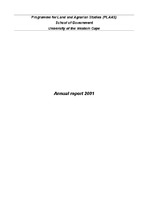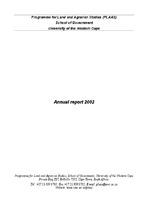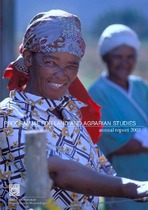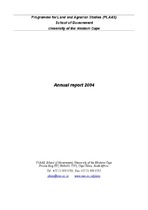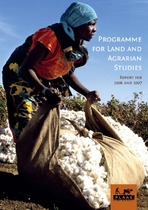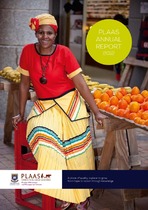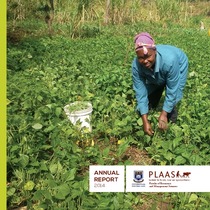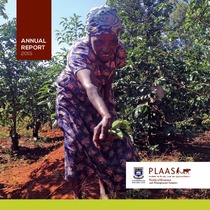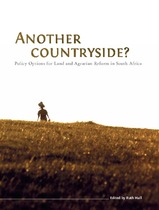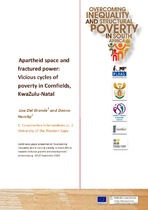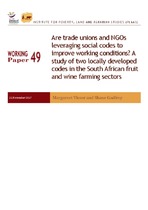Browsing Institute for Poverty, Land and Agrarian Studies (PLAAS) by Title
Now showing items 14-33 of 608
-
Agriculture, value chains and the rural non-farm economy in Malawi, South Africa and Zimbabwe
(Spinger Nature, 2019)This chapter compares rural development in Malawi, South Africa and Zimbabwe, concentrating on agricultural value chains and their implications for the rural non-farm economy (RNFE). Based on detailed qualitative exploration, ... -
Alleviating urban energy poverty in the informal sector: The role for local government
(Institute for Poverty Land and Agrarian Studies (PLAAS), 2010)The depth and severity of poverty and inequality persists in South Africa, despite progressive pro-poor policies. Strong evidence also points to the unbridled growth in informality and remaining as a long-term feature of ... -
The Alliance for a Green Revolution in Africa (AGRA and the occupation of the Guinea Savannah
(2015)The US, EU and African agricultural modernisation G8 New Alliance on Food Security and Nutrition (NAFSN), USAID and US foreign policy AGRA – Gate Foundation, Rockefeller Foundation – philanthro-capitalism Corporate ... -
Alternative food networks and food insecurity in South Africa
(Institute for Poverty, Land and Agrarian Studies, University of the Western Cape, 2016-06)Food security remains a persistent global challenge. Inequality means that food insecurity is disproportionately experienced. Despite positive shifts in the state of food security at a global scale, recent reports from ... -
Amendment submission: National policy for beneficiary selection and land allocation
(Institute for Poverty, Land and Agrarian Studies, 2020-03-02)PLAAS has read and considered the implications of the National Policy for Beneficiary Selection and Land Allocation and submits the following comments and recommendations to the Director-General: Rural Development and Land Reform. -
An Analysis of Renunciation in Terms of s 2(C)(1) of the Wills Act 7 of 1953 in Light of the Moosa NO and Others v Harnaker and Others Judgment
(Electronic Journal of Islamic and Middle Eastern Law (EJIMEL), 2019-05-29)Muslims have been living in South Africa for over 300 years. These persons are required in terms of their religion to fol-low Islamic law. There has (to date) been no legislation enacted by the South African parliament ... -
ANC election manifesto in relation to rural development and land reform
(PLAAS, 2009-06)In the last 15 years the Department of Land Affairs (DLA) has set out to achieve many things but, by its own admission, has been unsuccessful in meeting its objectives for land reform. Hence a few questions arise. Is land ... -
Annual report 2000
(Institute for Poverty Land and Agrarian Studies (PLAAS), 2001)The Programme for Land and Agrarian Studies (PLAAS) focuses on the land restitution and redistribution programmes initiated by the post-apartheid democratic state; land tenure reform; emerging regimes of natural resource ... -
Annual report 2001
(Institute for Poverty Land and Agrarian Studies (PLAAS), 2002)PLAAS continues to grow and to take on new projects and staff. This presents a number of challenges, not least of which is the sustainability of such growth. The year 2001 saw the completion of a twelve month-long ... -
Annual report 2002
(Institute for Poverty Land and Agrarian Studies (PLAAS), 2003)The year 2002 was an extremely busy one for PLAAS staff, and saw the initiation of many new projects and activities, some of them qualitatively different to anything undertaken before. These included an in-depth, national ... -
Annual report 2003
(Institute for Poverty Land and Agrarian Studies (PLAAS), 2004)Applied social science researchers generally want to see their research influence policy and practice; those of a more activist bent seek to ‘change the world, not simply to interpret it’.1 In its mission statement ... -
Annual report 2004
(Institute for Poverty Land and Agrarian Studies (PLAAS), 2005)The wider context of our research and training, and the ultimate rationale for establishing and maintaining a centre such as PLAAS, is the key challenge of deeply entrenched poverty, as well as the inequality to which ... -
Annual report 2006-2007
(Institute for Poverty Land and Agrarian Studies (PLAAS), 2008)Over the past two years the contradictions inherent in South Africa’s post-apartheid growth and development path have become increasingly evident. Growth has not managed to reduce very high levels of unemployment to a ... -
Annual report 2012
(Institute for Poverty Land and Agrarian Studies (PLAAS), 2013)In much of the global South the instability in global financial systems continued to have dire effects – and there were many worrying signs that the serious food price inflation the world experienced in 2008 would return. ... -
Annual report 2014
(Institute for Poverty Land and Agrarian Studies (PLAAS), 2015)Very often, in our work at PLAAS, we encounter two common misunderstandings about what it is that we do and why it is important. One common misunderstanding is that we are some sort of technical agricultural education ... -
Annual report 2015
(Institute for Poverty Land and Agrarian Studies (PLAAS), 2016)The year 2015 was a momentous one for PLAAS. It marked twenty years since the day that PLAAS started off as an organisation with some generous start-up funding from the Ford Foundation. PLAAS started life small: initially ... -
Another countryside? Policy options for land and agrarian reform in South Africa
(Institute for Poverty, Land and Agrarian Studies, University of the Western Cape, 2009)Land reform in South Africa is a political project that has foundered. For years, the process has been variously described as being ‘in crisis’, ‘at a crossroads’, ‘at an impasse’ or simply ’stuck’. This still seems as ... -
Another countryside? Policy options for land and agrarian reform in South Africa
(Institute for Poverty Land and Agrarian Studies (PLAAS), 2009)Land reform in South Africa is a political project that has foundered. For years, the process has been variously described as being ‘in crisis’, ‘at a crossroads’, ‘at an impasse’ or simply ’stuck’. This still seems as ... -
Apartheid space and fractured power: Vicious cycles of poverty in Cornfields, KwaZulu-Natal
(Institute for Poverty Land and Agrarian Studies (PLAAS), 2010)Apartheid space and fractured power: vicious cycles of poverty in Cornfields, KwaZulu-Natal A neglected area in the literature on structural poverty is changing land tenure relations and the disconnect with planning ... -
Are trade unions and NGOs leveraging social codes to improve working conditions? A study of two locally developed codes in the South African fruit and wine farming sectors
(Institute for Poverty, Land and Agrarian Studies, University of the Western Cape, 2017-11)The paper explores one aspect of the food security question, namely the livelihoods of farmworkers, which ultimately speaks to the sustainability of farms and the provision of food. It focuses on the emergence of locally ...


